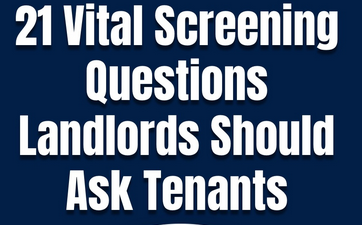
When a prospective tenant visits your property, you should be ready with a set of questions that will help separate genuine candidates from those likely to cause trouble in the future. 99acres shares a list of these important questions to ask from a prospective tenant.
What is your reason for shifting to a new property?

This is a great opening question as you would like to know their legitimate reasons for moving. Answers such as a change in jobs, family expansion, or need for a bigger space are acceptable reasons. However, eviction from the previous property, disputes with the landlord or neighbours should be considered as red flags. While the prospective tenant may not always tell the truth, this question is still worth asking. There are potential issues you would need to explore followed by relevant questions if somebody has been evicted before. If the person was asked to vacate the previous property for causing damage or excessive noise, such habits are not likely to change in the future.
What would be your move-in date?

This question can tell you a lot about the tenant. If an individual is in a hurry to move in, it may not be good news for you. Most landlords require prior notice of 30 days to terminate a lease, and if a tenant wants to move in, say, within a week, they may be breaching the contract with their existing landlord. A responsible tenant will start their search well in advance, of their anticipated shifting date. However, do not assume a breach of contract without clarifying the situation with the candidate.
How many people will be staying in the property?
“You can ask how many occupants will be moving in along with the tenant. It is advisable to mention all the occupants’ names in the lease agreement. You should, ideally, look for a maximum of two people per bedroom,” suggests Gautam Adhikari, Property Consultant, Adhikari Estates. Less number of occupants will lead to reduced wear and tear in the apartment.
What is your total income?
This question can be a difficult one to ask, as some tenants might not be comfortable answering it. However, it can help you determine if the applicant will be able to afford the apartment and pay the rent on time. “You should never rent your place to someone whose monthly income is less than 2.5 times the monthly rent,” advises Adhikari. Other screening questions related to employment may include:
How long have you been at your current job?
What is your position in the company?
Have you been hired for a time-bound contract?
What are your daily working hours?
Do you work in rotational shifts?
Can you offer one month’s rent and security deposit in advance?
This can partially replace the question about their income. Experts advise asking the tenant whether they are prepared to pay the first month’s rent and security deposit upon signing the lease. If they appear hesitant or offers to pay in installments, you are likely to have a difficult time getting your monthly rent timely.
Can you provide reference of your previous landlord?
If the prospective tenant hesitates to provide references, they might have something to hide. While their current landlord may not tell you the whole truth, the below-mentioned questions can help you decode the truth to some extent:
How long was the tenancy?

Did the tenant consistently pay rent on time?
Were there any major damages or maintenance issues?
Did you receive any complaints against the tenant from neighbours?
Why is the tenant leaving?
What is the length of lease you are looking for?
It is ideal to begin with a six-month or an 11-month lease. You would not want to go through all of the hard work again if a tenant asks for anything less.
Do you have any pet(s)?

A tenant with a pet can be a deal breaker for some landlords. While pets should not be the only criterion to strike a potential tenant off your list, it may represent an additional risk as pets could scratch furnishings or otherwise damage the property.
Things to remember
Avoid asking questions about a person’s disability. Discriminating on the basis of race or religion while choosing a tenant should also be avoided.
Once you are finished with your questions, give the tenant a chance to clear their doubts about the apartment, location, or neighbourhood.
Ask the applicant to fill out an application form and attach a copy of their bank statement, identity proof, utility bills, and office identification. The latter will confirm their employment claims. A bank statement will confirm the tenant’s ability to pay while asking for utility bills will help you check the previous address.